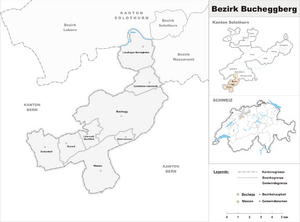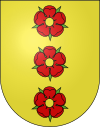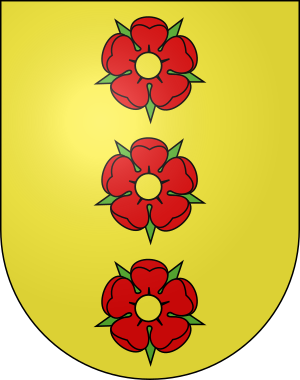Bucheggberg District facts for kids
Quick facts for kids
Bucheggberg District
Bezirk Bucheggberg
|
||
|---|---|---|
|
District
|
||
|
||
 |
||
| Country | ||
| Canton | ||
| Capital | Buchegg | |
| Area | ||
| • Total | 62.86 km2 (24.27 sq mi) | |
| Population
(31 December 2020)
|
||
| • Total | 8,009 | |
| • Density | 127.410/km2 (329.99/sq mi) | |
| Time zone | UTC+1 (CET) | |
| • Summer (DST) | UTC+2 (CEST) | |
| Municipalities | 8 | |
The Bucheggberg District is a special area in Switzerland. It is one of ten districts in the canton of Solothurn. You can find it in the southwest part of the canton. It's also part of a bigger area called Wasseramt-Bucheggberg. About 8,009 people live here today (as of 31 December 2020).
Contents
Towns and Villages
The Bucheggberg District has several towns and villages. These are called municipalities. Here is a list of them:
| Coat of arms | Municipality | Population (31 December 2020) |
Area, km2 |
|---|---|---|---|
| Biezwil | 344 | 4.18 | |
| Buchegg | 2,522 | 22.59 | |
| Lüsslingen-Nennigkofen | 1,101 | 7.81 | |
| Lüterkofen-Ichertswil | 878 | 4.40 | |
| Lüterswil-Gächliwil | 339 | 3.09 | |
| Messen | 1,471 | 11.88 | |
| Schnottwil | 1,135 | 7.19 | |
| Unterramsern | 219 | 1.54 | |
| Total | 8,009 | 62.86 |
How Towns Changed Over Time
Over the years, some smaller towns in Bucheggberg District have joined together. This helps them work better as one larger community.
- In 1961, Lüterkofen and Ichertswil became Lüterkofen-Ichertswil.
- In 1995, Gächliwil and Lüterswil joined to form Lüterswil-Gächliwil.
- In 2010, Balm bei Messen, Brunnenthal, and Oberramsern became part of Messen.
- In 2013, Lüsslingen and Nennigkofen merged into Lüsslingen-Nennigkofen.
- In 2014, many towns like Tscheppach, Brügglen, and Bibern joined to create the larger municipality of Buchegg.
Land and Nature
The Bucheggberg District covers an area of about 62.81 square kilometers (24.25 sq mi). A big part of this land, about 58.6%, is used for farming. This means there are many fields for growing crops.
Forests cover about 32% of the district. These are thick forests. About 8.5% of the land has buildings or roads. A small part, less than 1%, is made up of rivers or lakes.
Coat of Arms
Every district has a special symbol called a coat of arms. The coat of arms for Bucheggberg District shows three red roses on a yellow background. These roses are placed one above the other.
People and Languages
The Bucheggberg District has a population of about 8,009 people. Most people here speak German. In fact, about 97.4% of the population speaks German. A smaller number of people speak French (0.9%) or English (0.2%).
Many people who live in the district were also born there. About 35.6% of the people were born in Bucheggberg. Others were born in the same canton of Solothurn, or elsewhere in Switzerland. Some people (about 5%) were born outside of Switzerland.
The population has changed over the years. Here is a chart showing how the number of people has grown or shrunk:

Politics and Voting
In Switzerland, people vote for parties to represent them in the government. In the 2007 federal election, the most popular party in Bucheggberg was the FDP. They received about 33.6% of the votes. Other popular parties were the SVP and the SP. More than half of the people who could vote, about 53.5%, took part in this election.
Religion
Many different religions are practiced in Bucheggberg District. Most people belong to the Swiss Reformed Church, which is a type of Protestant church. About 74.3% of the population follows this religion. Another group, about 11.2%, are Roman Catholic. There are also smaller numbers of people who follow other Christian churches or Islam. Some people do not belong to any church.
Learning and Schools
Education is important in Bucheggberg. Many adults have finished their "upper secondary education." This is like high school or vocational training. About 41.4% of the people have completed this level of schooling.
Some people go on to even higher education. This means they attend a university or a specialized college. About 13.9% of the population has completed this advanced schooling.
See also
 In Spanish: Distrito de Bucheggberg para niños
In Spanish: Distrito de Bucheggberg para niños
 | Isaac Myers |
 | D. Hamilton Jackson |
 | A. Philip Randolph |



